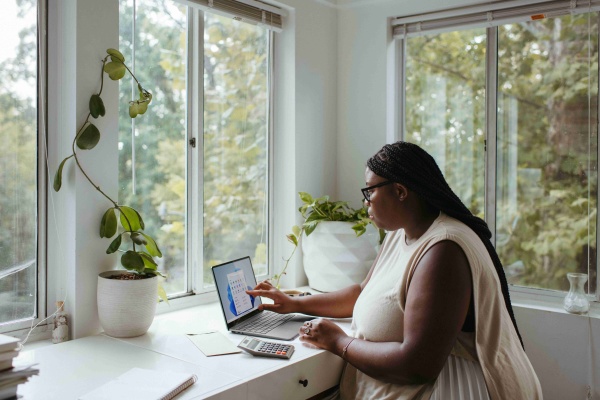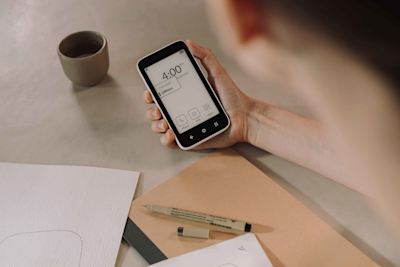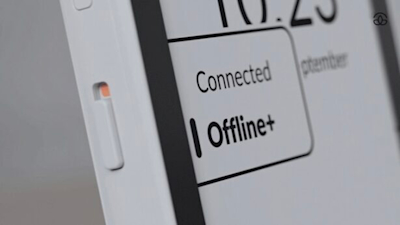
How to Find Work-Life Balance in the Digital Age
Is work-life balance possible in a hyper-connected world?
Welcome to the modern world, where technology and remote work have revolutionized the way we live, work, and even relax. (Yes, although lounging on the couch and binge-watching Netflix can feel relaxing, it may not always leave you feeling revitalized).
Thanks to digital advancements, we can now work from anywhere, anytime. However, with this freedom comes the challenge of finding a balance between work and personal life.
Have you ever felt like you can never truly switch off? Like work follows you everywhere, from your home to your vacation? Do you find yourself constantly struggling to achieve work-life balance and feeling the effects of stress and burnout? You're not alone. The truth is, finding work-life balance in the digital age is an ongoing journey which requires a mindful, intentional approach.
That’s why, at Mudita, we like to explore simple strategies which can help you achieve greater peace of mind and balance between your work and personal life.
So, get ready to learn how to unplug, create boundaries, be flexible, and enjoy a well-earned vacation.
Let’s get into it. But it doesn't have to be this way. By following a few simple strategies, we can find work-life balance and achieve greater peace of mind.
Learn to Unplug
One of the first steps to achieving work-life balance is learning to unplug. This means setting aside specific times during the day when you disconnect from work-related technology, such as your phone or work computer. It's important to make this a habit and stick to it, even when work is busy or deadlines are looming. Research has shown that unplugging from technology can help reduce stress, improve sleep, and increase overall well-being. We’ve also covered this topic in more detail in another article on our blog:
READ: Discover Why Unplugging is the Best Way to Recharge
To get started with unplugging, try setting aside a few hours each day when you don't check your email or take work-related calls. You could also consider taking a break from social media, which can be a major source of distraction and stress. Instead, use this time to engage in activities that promote relaxation and well-being, such as reading, meditating, or spending time with loved ones. We understand that in today's hyper-connected world it may be challenging for some individuals to embrace digital detox, so the easiest way to do this is before bed, as part of your offline bedtime routine. Sleep experts recommend avoiding screens 60-90 min before bedtime, in order to give our brain and our body time to wind down and prepare for sleep. If you use your smartphone as an alarm clock, then consider swapping it out for a more offline device, like Mudita Bell or Mudita Harmony. This way, you’re not tempted to scroll through your work emails or text colleagues, when you should be focused on rest and relaxation.
Get Intentional With Your Off Hours
Once you've learned to unplug, it's important to get intentional with your off hours. This means setting aside specific time for activities which promote relaxation and rejuvenation, such as exercise, hobbies, or spending time outdoors. By prioritizing these activities, you'll be better equipped to manage stress and maintain a healthy work-life balance.
Although living intentionally in a fast-paced world may be difficult, try scheduling specific activities into your calendar, such as a weekly yoga class or a weekend hike. You could also consider joining a social group or a club which aligns with your interests, such as a book club or a sports team. The key is to make these activities a regular part of your routine, rather than something you only do when you have spare time.
Create Strong Boundaries
In today's digital age, the boundaries between work and personal life are becoming increasingly blurred. That’s why another important strategy for achieving work-life balance is to create strong boundaries between your work and personal life. This means setting clear expectations with your colleagues and employers about when you're available for work-related tasks, and when you're not. By establishing these boundaries, you'll be able to more effectively manage your time and reduce the stress and anxiety that can come from feeling constantly connected to work.
READ: How to avoid work/life blur while working remotely
To create strong boundaries, try setting specific times when you'll be available for work-related tasks, such as responding to emails or taking calls. This can be tricky, since many of us have our productivity app directly on our digital devices, so we’re always within reach. Perhaps, you could also consider setting up an autoresponder on your email which lets people know when you're unavailable. If you do need to work outside of your regular hours, try to limit it to specific times and communicate this to your colleagues in advance
Be Flexible & Aim for Balance
While setting boundaries is important, it's also important to be flexible and aim for balance. This means recognizing that there may be times when you need to work outside of your regular hours, or when personal responsibilities require your attention during work hours. By being flexible and adaptable, you'll be better equipped to manage the demands of both your work and personal life.
Try to approach your schedule with a sense of balance, rather than trying to achieve a perfect division between work and personal time. This might mean working longer hours during a particularly busy week, but then taking time off to recharge and reconnect with loved ones. The key is to be mindful of your own needs and to prioritize balance and well-being in your schedule.
Enjoy a Well-Earned Vacation
The rise of remote work and digital technologies means that work can follow us everywhere we go, from our offices to our homes, and even extend to our vacations. This can lead to a lot of stress, burnout, and the feeling that we can never truly switch off.
Taking a vacation can also have a significant impact on both our mental and physical well-being, as there is ample evidence to suggest. Research has shown that taking regular vacations can help reduce stress, increase creativity, and improve overall well-being. The famous Framingham Heart Study, which analyzed 12,000 men, over 9 years, who were at risk for heart disease, found that those who took vacations more frequently tended to live longer. Meanwhile, other studies have shown that taking a vacation can lead to a reduction in clinical depression, blood pressure, and cortisol levels.
That’s why, it goes without saying that one of the best ways to achieve work-life balance, not to mention boosting your longevity, is to take a well-earned vacation. Vacations are an important opportunity to disconnect from work-related stress and recharge your batteries.
To properly enjoy a well-earned vacation, it’s important to plan your time off in advance and communicate this with your colleagues and employers. Make sure to set clear expectations about when you'll be unavailable and who will cover your responsibilities while you're away. And, when you're on vacation, try to disconnect from work-related technology as much as possible, so you can fully immerse yourself in relaxation and enjoyment.
Bottom line
Achieving work-life balance in the digital age requires a mindful, intentional approach. By learning to unplug, getting intentional with your off hours, creating strong boundaries, being flexible, and enjoying a well-earned vacation, you can find greater peace of mind and a more satisfying balance between your work and personal life. The benefits of achieving a healthy work-life balance are twofold. Not only does it have a positive impact on our overall health, but it can also lead to increased productivity.
Remember, it's important to prioritize your own well-being and to set realistic expectations for yourself and others. By doing so, you'll be better equipped to navigate the challenges of the modern workplace and achieve a more fulfilling and balanced life.
Related stories

Why 2025 Might Be the Year of the Dumbphone
In 2025, dumbphones are making a comeback. Learn how minimalist phones like Mudita Kompakt reflect a growing shift toward privacy and digital minimalism.

Why Mudita Kompakt is the digital detox we need right now
Mudita Kompakt is a minimalist phone designed for digital detox—no feeds, no tracking, just essential tools to help you reclaim focus, calm, and privacy.

What is a digital detox?
Discover what a digital detox is, why it matters, and how unplugging can boost sleep, reduce stress, and help you reconnect with what really matters.
If you'd like to receive the best stories from our blog, keep up to date with our progress and get notified about our product releases and special discounts.